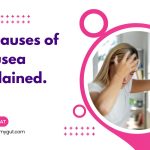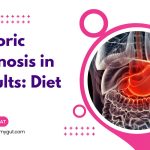Why is your Stomach Ulcer Not Healing: 6 Causes, Gastroenterologist Explains.
Our content is not intended nor recommended as a substitute for medical advice by your doctor. Use for informational purposes only.
About 5-10% of stomach ulcers don’t heal after a 12-week therapy with proton pump inhibitors (reference).
Common causes of non-healing stomach ulcers:
- Undiagnosed, untreated, or inadequately treated h. pylori infection.
- Big ulcer size or abnormal ulcer healing.
- Co-existing diseases include renal failure, liver cirrhosis, chronic respiratory diseases, and organ transplantation.
- Smoking.
- Medications such as continued use of NSAIDs, Corticosteroids, and others.
- Inadequate Proton pump inhibitors (such as omeprazole and esomeprazole).
- Diseases that cause increased acid secretion as gastrinoma and hyperparathyroidism.
- Other rare causes include Crohn’s stomach disease, Lymphoma, decreased blood supply to the gastric or duodenal mucosa (mesenteric ischemia), eosinophilic gastroenteritis, and others.
1. Persistent H. Pylori infection.
H. pylori is a bacteria that infects your stomach wall. It is one of the major causes of stomach and duodenal ulcers.
Therefore, H. pylori diagnosis and treatment are essential for the healing of h. pylori-associated ulcers.
Mostly, your doctor has tested you for H. pylori. H. Pylori persistence or recurrence after treatment can be why your stomach ulcer is not healing.
Causes of Persistent H. pylori (reference):
- Undiagnosed infection: if you didn’t get tested for h. pylori infection before.
(Testing of h. pylori are by either a urea breath test, a stool antigen test, or by taking a stomach wall sample via endoscopy). - Failure of treatment of h. pylori (often due to antibiotic resistance).
- Poor compliance to its 7-14 days treatment regimen.
- Recurrence of h. pylori infection: you can get re-infection after its eradication).
- Also, False-negative test results are common due to the use of PPIs such as omeprazole and esomeprazole, which mask the presence of h. pylori. Your doctor should stop such medications before re-testing for h. pylori.
2. Big ulcer size and abnormal stomach ulcer healing.
Sometimes, Your ulcer is not healing because of its bigger size. Also, Other ulcer characteristics may delay or prevent the healing.
Your gastroenterologist can only evaluate these ulcer characteristics. Therefore, your doctor often will need another endoscopy to evaluate such causes.
Ulcers characteristics that can prevent its healing (reference):
- Bigger stomach ulcer size.
- Severe ulcer inflammation.
- Excessive fibrosis and scarring of the ulcer.
- Decreased blood flow to the ulcer (which is essential for tissue repair and healing).
MORE: 5 Duodenal Ulcer Pain Locations and Mimics.
3. Smoking.
Smoking is a known risk factor for stomach ulcers. Moreover, continued smoking can delay the healing of your stomach ulcers (reference).
Cigarette contains multiple harmful chemicals. When you swallow portions of cigarette smoke, these chemicals harm your stomach ulcer.
Toxic chemical components of the smoke can:
- Prevent the lining of stomach cells from proliferation and healing.
- Disrupts the secretion of protective mucus that lines your stomach wall and helps ulcer healing.
- Affect blood vessels and blood flow (essential for the rapid healing of stomach ulcers).
- Alters your body’s immune response during the ulcer healing process.
Stop smoking immediately if you want your stomach ulcer to heal. It is one of the best things you can do.
4. Medications.
Many medications can interfere with the healing of your stomach ulcers. The most common causes include:
- Continued use of non-steroidal anti-inflammatory drugs (NSAIDs) such as Ibuprofen (Advil®), Aspirin, Diclofenac, and others.
- Glucocorticoids (corticosteroids) and cytotoxic medications: are used in immune-mediated diseases such as rheumatoid arthritis, systemic lupus, and others.
- Alendronate: a drug used to treat and prevent osteoporosis.
- Substance abuse: such as cocaine which impairs the blood supply to stomach ulcers preventing the healing process.
Call your doctor if you are taking any of the above medications. Your doctor is the only one who can weigh the benefits versus the risks of stopping such medications.
5. Inadequate PPI treatment.
One of the most common causes of ulcer non-healing is the suboptimal Proton pump inhibitor therapy.
Proton pump inhibitors (such as omeprazole, esomeprazole, and pantoprazole) are the main line of stomach ulcer treatment.
Severe factors can cause PPI failure and prevent ulcer healing:
- First, your body releases PPIs too fast (rapid drug deactivation).
- You are not taking the right dose of PPI.
- You are not taking PPIs at the right time.
- You are not sticking to the standard food and lifestyle advice for stomach ulcers.
6. Co-existing diseases.
Chronic disease can affect your overall health, immunity, and tissue healing. For example, organ failures and some chronic diseases may cause failure in stomach ulcer healing.
These chronic illness delays or prevent ulcer healing completely. Consult your doctor if you have one of the conditions below.
Examples (reference):
- Kidney impairment or kidney failure.
- Liver cell failure (liver cirrhosis).
- Respiratory failure (as chronic obstructive pulmonary diseases and interstitial lung diseases).
- Organ transplantation and the use of immunosuppressive drugs.
- Any severe critical illnesses.
7. Other (rare causes).
A. Diseases that cause acid hyper-secretion.
Zollinger-Ellison syndrome (gastrinoma) is a rare disease. Gastrinoma is a tumor located in the pancreas or the duodenum.
The tumor produces excessive amounts of gastrin hormone. The gastrin hormone stimulates excessive stomach acid production.
Patients with gastrinoma are often refractory to treatments. In addition, gastrinoma-related stomach ulcers are often difficult to heal.
B. Stomach cancer.
A stomach ulcer can be malignant. Unfortunately, malignant stomach ulcers don’t heal with classical drug therapy.
Symptoms of malignant stomach ulcers:
- Upper-middle stomach pain and heartburn that doesn’t go away.
- Feeling full after eating small amounts of your meal.
- Bloating after eating.
- Nausea, vomiting.
- Weight loss.
- Vomiting of blood or passage of dark stool.
- Unexplained fever.
- Difficulty swallowing.
Learn more about stomach cancer.
C. Crohn’s disease.
Crohn’s disease is a chronic inflammatory disease of unknown cause. Crohn’s disease can affect your stomach wall (reference).
It causes inflammation and stomach ulcers that are not healing with PPIs.
Learn more about Crohn’s gastritis.
D. Others
Other rare diseases may also lead to non-healing stomach ulcers. Examples are autoimmune gastritis, eosinophilic gastritis, biliary gastritis, mesenteric ischemia, and cytomegalovirus gastritis.
- Evidence-based
- Written by a doctor.

Related Posts:
- 123+ Short Messages for Doctors: Healing Words of Thanks.
- 6 Causes of Bigger Stomach after Gallbladder Surgery…
- Stomach Pain at Night and Early Morning: 6 Causes,…
- Stomach Cramps And Gas: The 5 widespread causes…
- Can Stress Cause Appendicitis? Gastroenterologist Explains.
- Untreated Pancreatitis: 6 Possible Scenarios…






